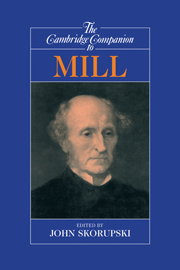Book contents
- Frontmatter
- Introduction
- 1 Mill on language and logic
- 2 Mill, mathematics, and the naturalist tradition
- 3 Mill on induction and scientific method
- 4 Mill, phenomenalism, and the self
- 5 Mill on religion
- 6 Mill on psychology and the moral sciences
- 7 Mill's utilitarianism
- 8 Mill's political economy
- 9 Civilization and culture as moral concepts
- 10 Democracy, socialism, and the working classes
- 11 The subjection of women
- 12 Mill and the Classical world
- 13 The reception and early reputation of Mill's political thought
- 14 Mill in a liberal landscape
- Guide to further reading
- Bibliography
- Index
10 - Democracy, socialism, and the working classes
Published online by Cambridge University Press: 28 May 2006
- Frontmatter
- Introduction
- 1 Mill on language and logic
- 2 Mill, mathematics, and the naturalist tradition
- 3 Mill on induction and scientific method
- 4 Mill, phenomenalism, and the self
- 5 Mill on religion
- 6 Mill on psychology and the moral sciences
- 7 Mill's utilitarianism
- 8 Mill's political economy
- 9 Civilization and culture as moral concepts
- 10 Democracy, socialism, and the working classes
- 11 The subjection of women
- 12 Mill and the Classical world
- 13 The reception and early reputation of Mill's political thought
- 14 Mill in a liberal landscape
- Guide to further reading
- Bibliography
- Index
Summary
When Mill was addressing a public meeting in his campaign to be elected as a member of Parliament, he was handed a placard with a quotation taken from one of his works that “the lower classes, though mostly habitual liars, are ashamed of lying”, and he was asked whether he had written those words. When he answered “I did”, the meeting, consisting largely of the working classes, applauded loudly. This incident epitomizes some of Mill's characteristic attitudes towards the working classes. He did not think much of their present intellectual and moral qualities. But he was prepared to speak frankly about them. His obvious pleasure at their favourable response to his openness confirmed his view that they had the capacity and willingness to improve themselves. He wanted to provide them with the opportunities for such improvement. He saw himself as their friend, or “a person whom they could trust” (CW I:274). But his idea of improvement was not to impose paternalistically his own conception of their interests on them, but instead to increase the scope for them to voice their interests, while at the same time subjecting them to various influences, including the influences, though not the direction, of abler persons, in order to advance their mental cultivation and thereby to broaden their interests. His hopes for their future well-being were tempered by his fears about letting them dominate social and political life in their present unenlightened state. So another part of his case for social and political reform focussed on finding a counterpoise to the prevailing views and on ensuring greater diversity. In the end, it was his overriding concern for the fate of individual freedom and development which guided all his social and political proposals.
- Type
- Chapter
- Information
- The Cambridge Companion to Mill , pp. 372 - 395Publisher: Cambridge University PressPrint publication year: 1998
- 13
- Cited by

